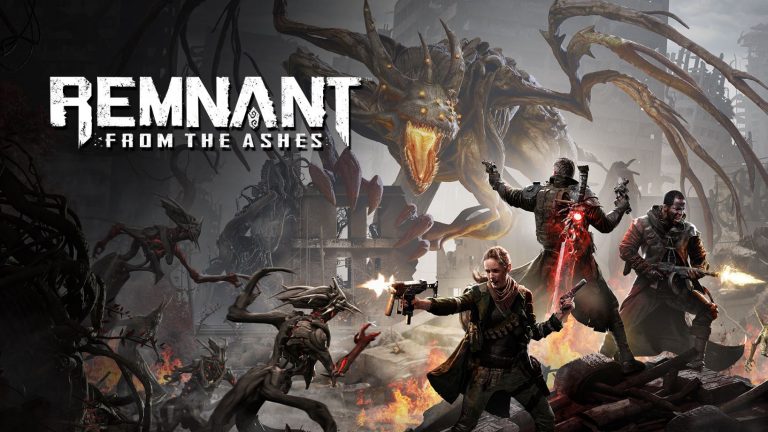
During my run through of the core campaign for Remnant: From The Ashes, I saw some incredible locations, fought in some tough, yet thrilling boss fights, and earned interesting and unique weapons. Playing through Remnant has been incredibly enjoyable because all of its moving parts fit together surprisingly well.
But, the enjoyment of Remnant’s third-person looting and shooting is often interrupted by a number of technical issues and difficulty spikes that are exhausting to deal with. They are potent enough to hold the game back from becoming one of the best Double-A titles on the market today.
Getting To The Root Of The Problem
Remnant takes place in a universe where a mysterious evil called The Root, travels from realm to realm, leaving destruction in its wake and taking over everything it comes into contact with. Eventually, The Root made its way to Earth and forced humanity into hiding. They take refuge in Wards, scattered across the planet.
After creating your character, with a fairly large range of options, you are saved by the inhabitants of Ward 13; the only Ward to have access to a magical object called the World Stone that allows you to travel between realms. So, you and up to two other friends fight through four substantially different realms across a 15 or so hour campaign, with the goal of finding the source of The Root and destroying it once and for all.

That narrative is fairly simple and it stays that way, but Gunfire Games expertly use it as a way to introduce you to the wider world they have created, which involves Gods, entirely different species and their monarchies, and even the concept of using humans as gateways to other realms.
Remnant’s lore gets pretty insane, but it is never hard to grasp or enjoy. Multiple set pieces happen during the main campaign that are cool and unexpected, creating genuine surprise moments that entice you to keep playing. The work Gunfire Games has put into the world-building shows and Remnant often feels like you are reading a great book. Constantly anticipating the next page just to see the events that transpire.
I also appreciated just how much care was taken when it comes to the dialogue and characters in the game. Every NPC you can talk to has a list of questions you can ask them that explain power dynamics between different species, the backstory on The Root, and the lives of the people you are talking to.
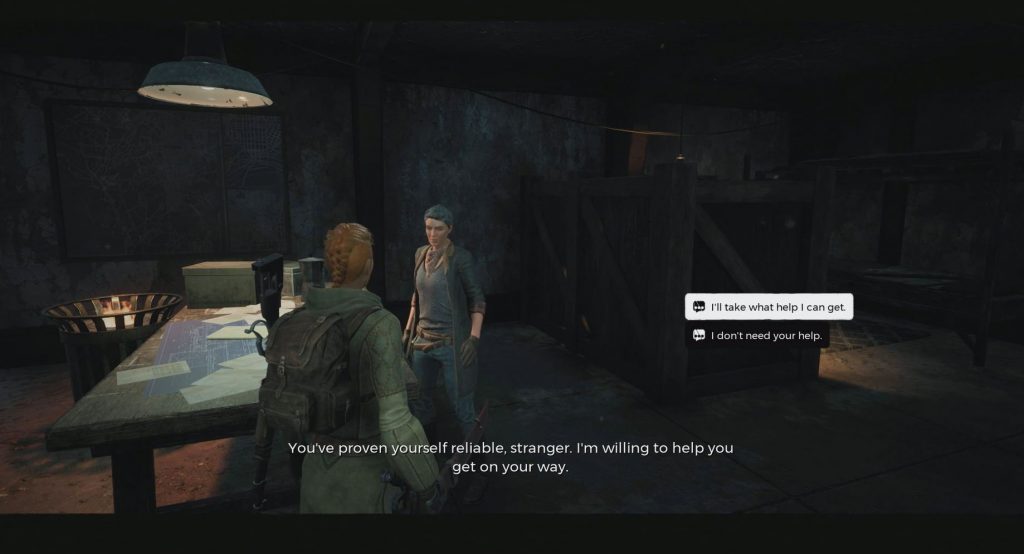
They feel like genuine characters and people you get to know over the course of the game, rather than just a vendor that you revisit every 45 minutes to buy something from.
A Different Breed Of Looter-Shooter
When it comes to the gameplay, Remnant takes inspiration from a lot of different games and genres. It has elements of Destiny, Warframe, Dark Souls, and Bloodborne within it, as well as some unique ideas and twists of its own. But, at its core, the game is a looter shooter from a third person perspective.
However, don’t be turned off by that definition; because instead of picking up new weapons and armor every thirty seconds and having to keep track of dozens of quests and bounties, Gunfire Games’ take on the genre focuses on meaningful loot, where each weapon is a viable option, and a condensed set of missions and areas that you replay over and over.
As you fight your way through the four realms in the game, you are mostly picking up Scrap and crafting materials. The former you spend at vendors to buy consumable buffs and healing items and the latter is used to upgrade your weapons and armor at the various characters in Ward 13.
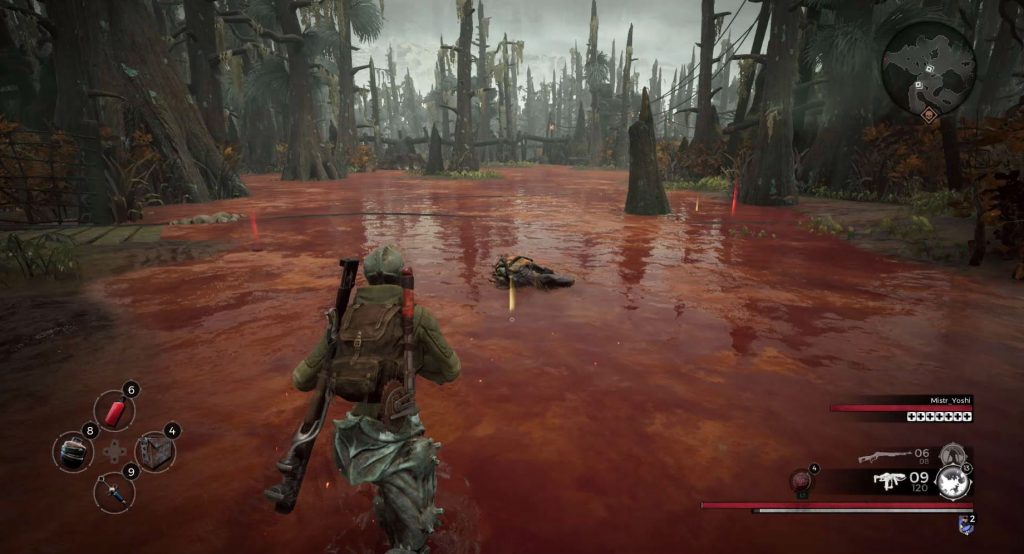
Armor is found through solving puzzles and finding secret locations, whilst earning new weapons is mostly done by entering randomly generated dungeons from the four realms’ overworlds and defeating the bosses at the end. The dungeons you get and the chance of finding the materials to make the weapon are randomised. The overworlds and their connected dungeons offer a nice variety of both enemy combatants and environments.
The rusted out, barren metal structures of Rhom are surprisingly eerie and the twisty, foreboding forest of Yaesha made me consistently paranoid that horrifying creatures would sneak up behind me and attack. Each realm has its own enemy race as well, from the Root on Earth to the disgusting bug-like creatures known as the Iskal on Corsus.
These four realms provided more than enough variety during the main campaign and continued to do so afterwards, and they feel like the right balance, allowing you to familiarise yourself with each combatant, but also not grow tired of fighting the same enemy over an over. On top of that, the enemy variety is bolstered by a selection of Special Enemies who will spawn in periodically and offer you a tougher fight.
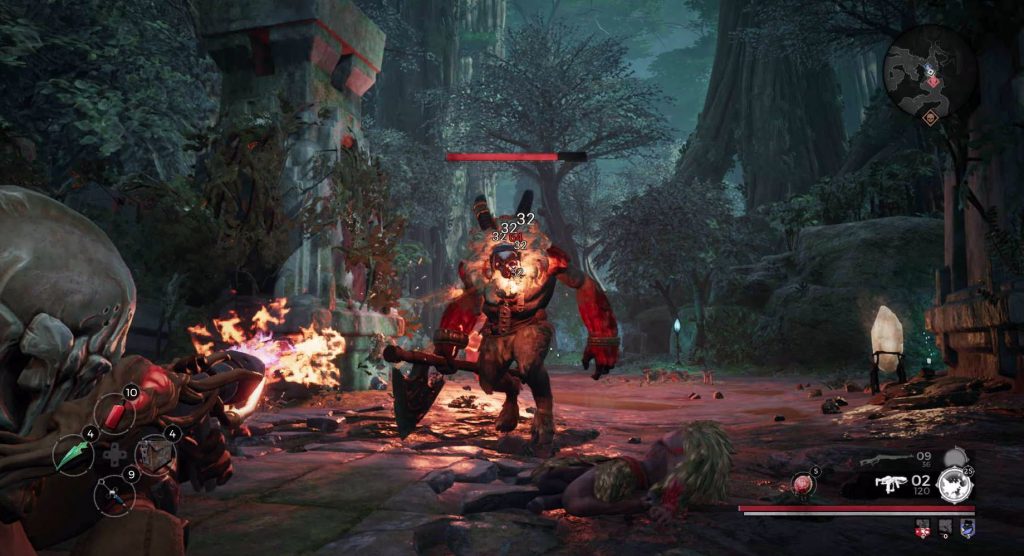
However, this is where the technical issues start. Remnant on PS4 suffers from a number of frame drops when exploring and fighting in these overworlds and their connected dungeons. Most of the time it was noticeable and annoying, but never made the game unplayable. But, when fighting on Corsus, the game can grind to a halt and become borderline unplayable if enough enemies are on screen at once. Gunfire knows of the issues and will continue to support the game and make it more stable, but at launch, the frame rate drops are unforgivable at times.
Back to the Dungeons. As you explore each overworld, you will come across various gates that will teleport you into a dungeon, which has a number of different room templates placed one after another, as well as its own unique enemies. The repetition when it comes to these room templates was noticeable, but I never grew bored because of the boss that was awaiting at the end.
And, when you do get to the end, you are greeted by a very From Software-style Fog Gate, which unveils a boss on the other side once you pass through. The bosses are where Remnant’s best moments happen. Offering a wide variety of designs and playstyles, each one feels like a hulking beast you need to decipher, figuring out their attack pattern and discovering how to control the additional enemies that spawn throughout the fight.
During my time playing, I have come across a giant fire-breathing dragon, a small flying bird, a hunter with a crossbow, a twisted amalgamation of poison ivy, an enemy-summoning monkey, and so many others. On top of that, there are tons that I still haven’t fought. The variety in bosses you face is quite large and each one requires a different set of tactics to beat.
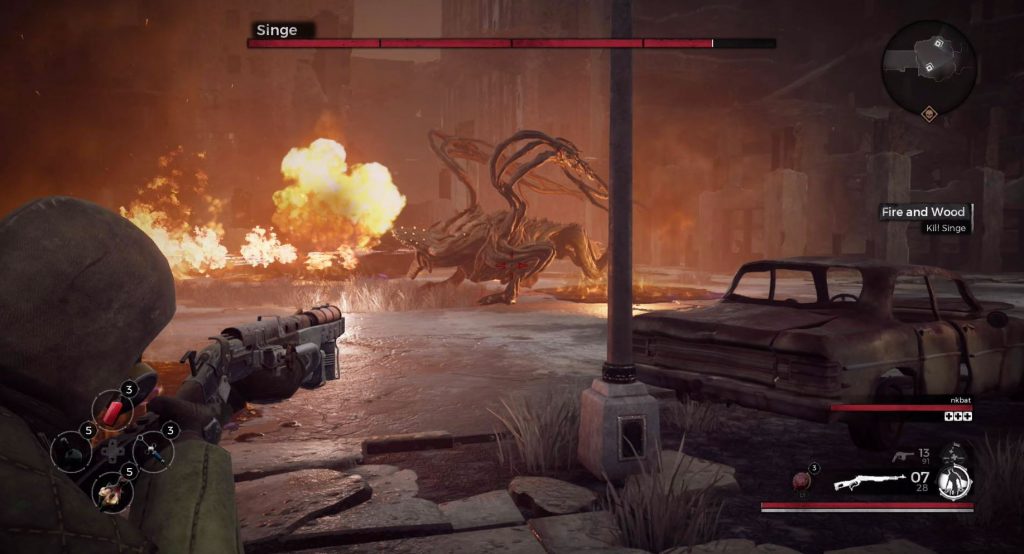
The majority of these are an absolute thrill to fight and require you to be on top of your game, constantly aware of your surroundings and making sure you have enough health and ammo. Both of these are limited, with Health being refilled by using your Dragon’s Heart, which has a limited number of uses and is refilled when sitting at a checkpoint. Ammo, on the other hand, is found off of the corpses of enemies.
Yet, whilst the majority of these fights are are fun, the game occasionally throws a boss at you which spikes in difficulty and feels wholly unfair. When this happened I would be sent into an angry rant because there was nothing I was doing wrong. Instead, the boss had a cheap attack or the room was packed with enemies to the point that I couldn’t keep track of everything that was going on.
And when this happened, I was always left disappointed. This is because Remnant is so fun to play and its bosses are fun to fight against when the game feels balanced and tough, but not frustrating. However, when a certain encounter begins to feel like it wasn’t tested enough or balanced right, Remnant can feel like you are trying to break through a brick wall with nothing but a paintbrush.
Statistics And Synergy
Although Remnant is a lot simpler than most looter shooters on the market in terms of gameplay, the depth and RPG-aspects of character progression and build customisation is just as complex and varied. You have a suite of traits than you can spend points in as you progress through the game. These buff a variety of stats, such as stamina regeneration and elemental damage resistance, and expand as you progress through the game. You can invest in any of these as much as you want and the game offers a lot of flexibility here.
Each weapon has a weapon mod slot which provides an active bonus when activated. These range from imbuing your bullets with fire to placing down a healing field to highlighting all the enemies in red and allowing you to see them through walls. Weapon Mods can be swapped out on the fly after crafting them in Ward 13 and allow for a deep level of customisation, as well as the ability to find a playstyle that fits you.
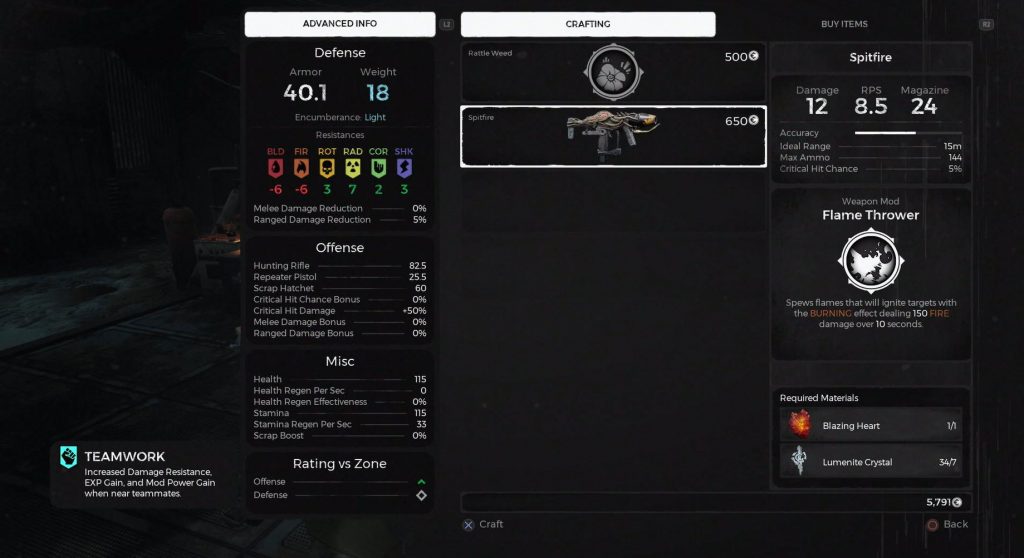
Some weapons feature intrinsic Weapon Mods that are locked to that weapon and can’t be swapped out. These usually provide a powerful alternative fire, that is limited in usage but deadly in damage. All of these weapon mods recharge as you deal damage to enemies.
On top of all those options, there is an extensive advanced statistics screen filled with elemental resistances, offence bonuses, health recharge effectiveness, and even damage reduction. If you want to chase that perfect build or become incredibly resistant to corrosive damage for example, then Remnant absolutely will let you do that through finding different armor pieces and equipping different rings and trinkets that offer bonus effects.
That is where the replayability of Remnant comes in, with you chasing a particular weapon or becoming proficient at one thing. Remnant is definitely something I will return to over and over again to work towards a unique weapon, with a really cool design or Mod. You can even re-roll the main campaign of the game, to run through it again and find different gear.

There is even the possibility to synergise your builds with your teammates when playing together and create some powerful loadouts that can absolutely decimate bosses, with them practically dying in the blink of an eye.
Whilst I am on the subject of teammates, Remnant offers full matchmaking, as well as the ability to play with a friend. However, you can’t exactly search for a particular mission or boss you want. You either have to join a random game, which could be taking place anywhere from the first mission to the final boss, or you have to enter the game solo and leave your party open, allowing people to randomly join you.
It feels a little slapped together and I find it a little odd that you can’t join people who are on a specific mission or fighting in a specific realm. Playing with other people is quite a bit of fun and can make some fights easier to manage. Connections were solid throughout and I rarely experienced lag. Although, I did have the game crash on me multiple times during multiplayer, forcing me to reload the game and restart entire encounters from scratch.
A World And Gameplay Experience Marred By Technical Issues
Remnant From The Ashes will probably end up being one of my favourite double-A games of all time. Its core gameplay loop of randomised dungeons and weapon farming is incredibly enjoyable. The depth available in terms of character builds is married with some excellent world-building and lore.
Gunfire has put a lot of work into Remnant and it shows. The shooting feels great, the bosses are mostly fun to fight, and the world is enticing and worth exploring with secrets hidden away. However, the stability of the PS4 version is quite poor, with multiple frame rate issues and crashes making the experience sometimes exhausting and draining. This is coupled by some fights that feel unbalanced and are frustrating.
Remnant: From The Ashes is absolutely worth playing, but you might want to wait for a few patches to come out first.
Remnant: From The Ashes is available now on PS4, Xbox One, and PC.
Review code provided by publisher.
Original Article © psu.com



No comments
Post a Comment